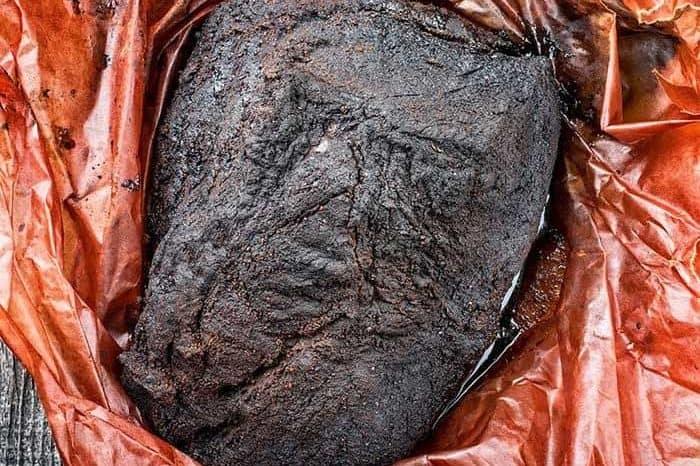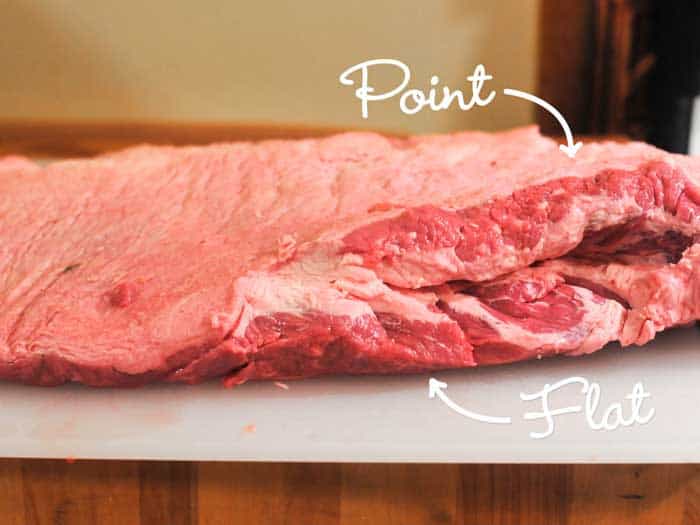The Aaron Franklin method for smoking brisket has become one of the world’s most beloved barbecue techniques. Learn how to make one of the world’s best smoked brisket recipes today!

For newcomers to BBQ, top of their list of beef cuts to conquer sits brisket.
You are watching: Aaron Franklin’s Signature Brisket Recipe – EXPLAINED
It’s long remained one of the world’s most iconic BBQ meats, and once you have some it’s no wonder why. It’s beautifully tender, packed full of flavor, and if you can develop that beautiful bark on top… Oh boy!
It’s not an easy meat to get right though. It takes time, patience, and craft. So it’s not unusual for it to take a few attempts to nail down.
Thankfully this approach from Aaron Franklin might have come up trumps with this Texas Brisket Recipe.
The key to the approach is simplicity. Don’t get in the weeds too much with specific rubs, types of woodchip, or brines.
Rather than layer in a complex BBQ rub, Aaron makes use of a simple rub of salt and pepper in a 1:1 ratio. This helps dry brine the meat so that it locks in its natural flavors, while giving it a smokey edge with the pepper.
It’s then cooked over a simple blend of oak for a simple BBQ taste that allows the juices in the brisket to do their work. If you want to experiment a bit, try adding a touch of hickory. But only a touch.
Here are the main things to keep in mind when smoking BBQ brisket with the Aaron Franklin method.
How to Choose a Brisket
The recipe recommends keeping the fat cap on. In most cases, I’ve always recommended removing it, but Aaron argues that this will help keep the brisket warm. Because the cooking time on this is so much longer than other barbecue brisket recipes, I’m happy to go along with him here.

Read more : What Can You Substitute for Buttermilk?
It doesn’t stop there though. Aaron recommends cooking the entire thing, which also means leaving the point and flat intact and connected.
So when you choose your whole brisket, you want both flat and point together. This is often referred to as a packer brisket. Doing this will also give you much more control over exactly what you trim later.
Keep an eye out for marbling. This is the streams of fat and connective tissues that we see running through the flesh of red meat. It’s an indicator of good meat for smoking because as it’s cooked low and slow it will begin to melt away, leaving us with beautifully moist and rich flavors.
Also keep an eye out for a thick flat. This will allow the leaner parts of the beef underneath it to cook at the same rate as the rest of the beef.
How to Trim Brisket
Trimming brisket is a fine balancing act. Leaving too much fat on will make it rubbery. Trimming too much off will make it dry.
As a rule, try to remove about one-inch of fat across the flat cap.
Brisket often contains a thick membrane called the deckle. For meat geeks, this sits between the rib cage and the pectoralis profundus muscle. The deckle will not render when you cook it, so it’s important that this is removed. Your butcher may have already done this, but if not then it’s crucial that you do this.
Like with any meat, brisket is firmer when cold. This makes it the best time to trim it, so try to do it when you’ve just removed it from the refrigerator.
Aim to remove any stray parts of thin meat. These will cook much faster, and be more prone to drying out or even burning.
Cutting brisket isn’t an exact science. As long as you have a one-quarter-inch layer of fat left intact then you’ll be good to go.
Use a Simple BBQ Brisket Rub
Read more : 6 Best Essential Oils for Diverticulitis (Backed with Data)
The key here is to forget complicated spices or herbs, and simply go with a simple salt and pepper blend.
Aaron Franklin’s recipe is all about simplicity. Our BBQ rub here is the perfect example of that.
Using just this simple seasoning will do enough to dry brine the beef a little, and impart just a touch of flavor. We don’t need to do anything more than that.
Use equal parts Kosher salt to black pepper (usually half a cup of each is enough) and mix together. Apply all over the brisket, but don’t be too generous.
Once you have applied the rub, leave the brisket for an hour at room temperature. This will allow the brisket temperature to come up slightly, while also allowing the salt to do its work and stimulate the moisture in the meat.
Note: If you do want to try adding a touch more flavor to your barbecue brisket, try experimenting with other rubs. There are some great store-bought brisket rubs out there for you to start with.
How to Position Your Brisket
There’s a bit of debate about what the best way to position brisket on your smoker is, and much of this is around whether you should place it fat side up or down.
Despite what you might hear, the truth is that meat can’t absorb fat (source). On the other hand, leaving it facing down can create a lot of run-off, with the rendered fat from the cap dripping directly onto the foot of your chamber.
Understandably, this has led to a lot of debate around whether you should place your brisket fat side up or down.
Aaron recommends placing it fat side up, with the point of the brisket placed closest to your heat source. The extra fat on the point will help protect the meat from direct exposure to heat.
Ensure that you place a water pan in the smoker chamber to help provide moisture, and reducing the risk of burning or your meat drying out.
Source: https://gardencourte.com
Categories: Recipe


